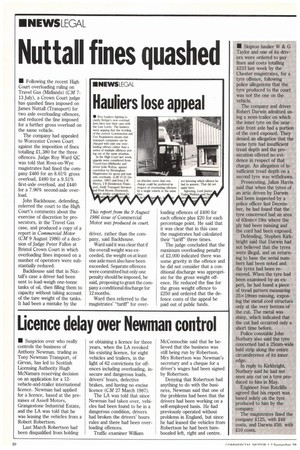Nuttall fines quashed
Page 16

If you've noticed an error in this article please click here to report it so we can fix it.
• Following the recent High Court overloading ruling on Travel Gas (Midlands) (CM 713 July), a Crown Court judge has quashed fines imposed on James Nuttall (Transport) for two axle overloading offences, and reduced the fine imposed for a further gross overload on the same vehicle.
The company had appealed to Worcester Crown Court against the imposition of fines totalling £1,380 for the three offences. Judge Roy Ward QC was told that Ross-on-Wye magistrates had fined the company £460 for an 8.61% gross overload, £480 for a 9.51% first-axle overload, and 2440 for a 7.96% second-axle overload.
John Backhouse, defending, referred the court to the High Court's comments about the exercise of discretion by prosecutors, in the Travel Gas case, and produced a copy of a report in Commercial Motor (CM 9 August 1986) of a decision of Judge Peter Fallon at Bristol Crown Court in which overloading fines imposed on a number of operators were substantially reduced.
Backhouse said that in Nuttail's case a driver had been sent to load-weigh one-tonne tanks of oil, then filling them to capacity without taking account of the tare weight of the tanks. It had been a mistake by the driver, rather than the company, said Backhouse.
Ward said it was clear that if the overall weight was exceeded, the weight on at least one axle must also have been exceeded. Separate offences were committed but only one penalty should be imposed, he said, proposing to grant the company a conditional discharge for 12 months.
Ward then referred to the magistrates' "tariff" for over loading offences of £400 for each offence plus 220 for each percentage point. He said that it was clear that in this case the magistrates had calculated their "tariff" three times.
The judge concluded that the maximum overloading penalty of £2,000 indicated there was some gravity in the offence and he did not consider that a conditional discharge was appropriate for the gross weight offence. He reduced the fine for the gross weight offence to £250 and ordered that the defence costs of the appeal be paid out of public funds.
















































